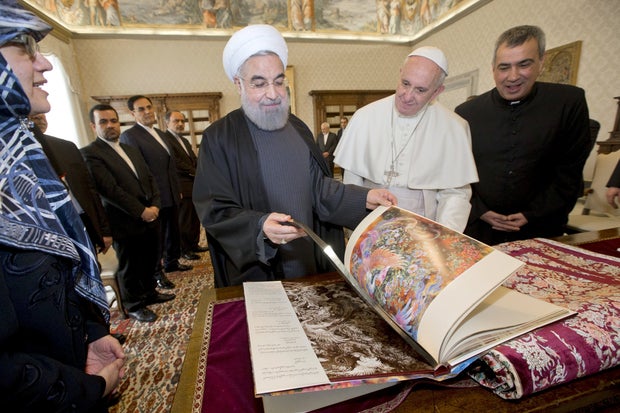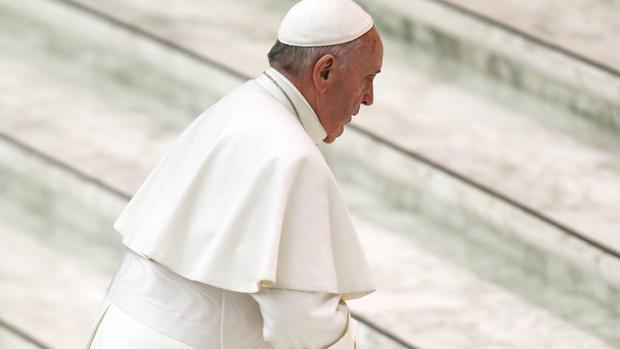Iran leader meets Pope Francis, asks for his prayers
VATICAN CITY -- Iran's president asked Pope Francis to pray for him Tuesday after the two men held private talks at the Vatican, part of an Iranian effort to take a more prominent place on the world stage after a nuclear deal with Western powers.
Hassan Rouhani's visit to the Holy See saw the first meeting between a pope and an Iranian president since 1999. Iran, which agreed to limit its nuclear activities in exchange for an end to economic sanctions, is eager to carve out a bigger role in mediating Middle East conflicts. Francis' papacy has been marked by mediation and conflict resolution.
The Iranian leader is on a four-day European swing to boost Iran's image abroad as well as to rehabilitate economic ties with a continent that had been a big trade partner before sanctions.
- Kerry: Some Iran sanctions relief likely to go to terrorists
- Iran may welcome in Asian, European firms before U.S.
- GOP senators plan to prep new sanctions against Iran
"I ask you to pray for me," Rouhani told Francis after their 40-minute meeting. He called the visit by the leader of a Muslim country to the head of the Roman Catholic church "a real pleasure."
Francis thanked Rouhani for the visit and added: "I hope for peace."
The Vatican issued a statement after the meeting urging Iran to use its rising profile on the world stage to combat terrorism.
Francis gave the Iranian leader a medal depicting St. Martin helping a poor man, an act Francis called "a sign of unsolicited brotherhood."
Rouhani brought a gift of a hand-made rug. He told the pope the red-toned carpet was made in the Iranian holy city of Qhom. The Iranian also presented Francis with a book of illustrationsl.
Rouhani arrived for the late-morning, closed-door meeting in a motorcade of some two dozen limousines. Security, already tight around the Vatican following the Nov. 13 attacks in Paris, was even more rigid than usual. Police kept tourists and Romans from walking too close to the colonnade ringing the square before and during the visit.
In his nearly three years as pope, Francis has stressed mediation as the best way to solve conflicts. He played a key role in helping Cuba and the United States to normalize their relations after decades of strict embargo.
Tehran is keen on re-establishing energy and other economic ties with Europe, long a dependable trading partner. Iran also wants to end decades of diplomatic distance with the West in the wake of the landmark deal with six nations, including the United States, to curb Tehran's nuclear activities and end economic sanctions.
Before going to the Vatican, Rouhani told a forum of business leaders in Rome that "Iran is the safest and most stable country of the entire region." It is the first state visit by an Iranian president to Europe in nearly two decades.
Italy also sees Iran as a potential peacemaker in Syria's civil war, as the Italian government fears the warfare will further destabilize Libya, just across the Mediterranean from southern Italy, fuel terrorism and jeopardize energy security.
"Italy has always backed the role of Iran as a regional player in resolving tensions in the area, starting with the Syrian crisis," Foreign Minister Paolo Gentiloni said after meeting his Iranian counterpart, according to his office.
Rouhani has described the political talks leading to the nuclear deal as a potential blueprint for pursuing peace in the Middle East.
Rouhani's four-day visit to Italy and France is part of efforts by Iran to reach out to its old partners following the implementation of the nuclear deal, and Rouhani is eager for foreign investment after the lifting of international sanctions. The trip was originally planned for November but postponed because of the attacks in Paris.

